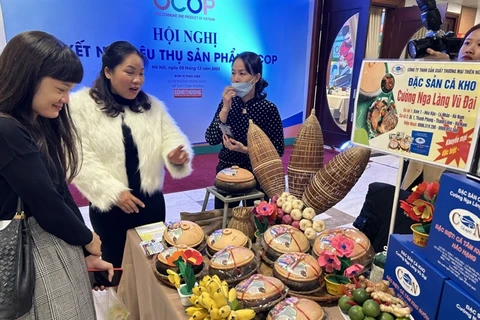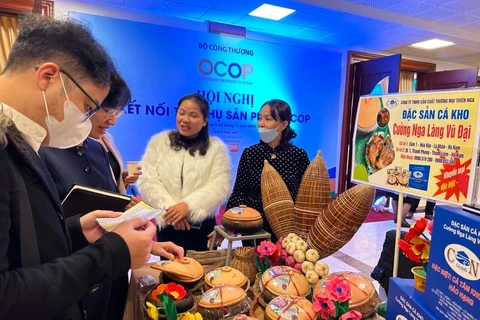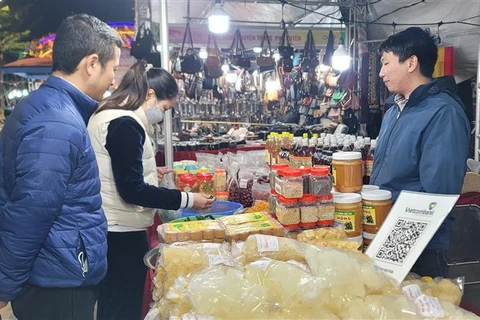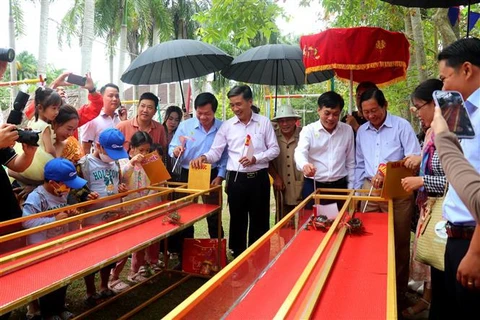HCM City (VNA) – The One Commune One Product (OCOP) Programme has no longer been a pure poverty reduction measure for rural areas, but an important boost for Vietnamese agricultural products, connecting other industries for mutual development, thus bringing dual benefits for rural areas, according to experts.
Deputy Minister of Agriculture and Rural Development Phung Duc Tien said that OCOP products have contributed to shifting thinking from agricultural production to production associated with business, especially linking agricultural development with economic, service and tourism development of localities.
According to statistics of the Ministry of Agriculture and Rural Development, the country has over 10,800 OCOP products rated three stars or higher from over 5,600 OCOP entities, of which 37.9% are cooperatives, 24% are enterprises, 35.2% are production establishments/business households, and the remainder are cooperative groups.
The Mekong Delta region has more than 2,000 three-to-five-star OCOP products, led by Dong Thap province with 357 products.
Localities in the region have had many strategies linking OCOP products with tourism to create a dual economic advantage based on their specific characteristics.
Chairman of the People’s Committee of Dong Thap province Pham Thien Nghia said that local OCOP products have gradually entered modern distribution channels such as supermarkets or shopping centres. Dong Thap is also promoting community-based tourism products and OCOP products, craft village ones, and cultural festivals to create a highlight to attract tourists.
Tourism models combined with agriculture are operating quite effectively, helping to lengthen the value chain, increase the value of agricultural products, create more jobs in rural areas, and bring stable income to farmers.
Similarly, Can Tho city also considers the OCOP programme as one of the major agricultural and rural economic programmes that clearly demonstrates the role of multi-value integration in the agricultural sector. Currently, the city has 92 three- and four-star OCOP products.
To create favourable conditions for these products to develop, the city has brought them into tourist attractions, hotels, restaurants to make them closer to tourists./.
Deputy Minister of Agriculture and Rural Development Phung Duc Tien said that OCOP products have contributed to shifting thinking from agricultural production to production associated with business, especially linking agricultural development with economic, service and tourism development of localities.
According to statistics of the Ministry of Agriculture and Rural Development, the country has over 10,800 OCOP products rated three stars or higher from over 5,600 OCOP entities, of which 37.9% are cooperatives, 24% are enterprises, 35.2% are production establishments/business households, and the remainder are cooperative groups.
The Mekong Delta region has more than 2,000 three-to-five-star OCOP products, led by Dong Thap province with 357 products.
Localities in the region have had many strategies linking OCOP products with tourism to create a dual economic advantage based on their specific characteristics.
Chairman of the People’s Committee of Dong Thap province Pham Thien Nghia said that local OCOP products have gradually entered modern distribution channels such as supermarkets or shopping centres. Dong Thap is also promoting community-based tourism products and OCOP products, craft village ones, and cultural festivals to create a highlight to attract tourists.
Tourism models combined with agriculture are operating quite effectively, helping to lengthen the value chain, increase the value of agricultural products, create more jobs in rural areas, and bring stable income to farmers.
Similarly, Can Tho city also considers the OCOP programme as one of the major agricultural and rural economic programmes that clearly demonstrates the role of multi-value integration in the agricultural sector. Currently, the city has 92 three- and four-star OCOP products.
To create favourable conditions for these products to develop, the city has brought them into tourist attractions, hotels, restaurants to make them closer to tourists./.
VNA
























